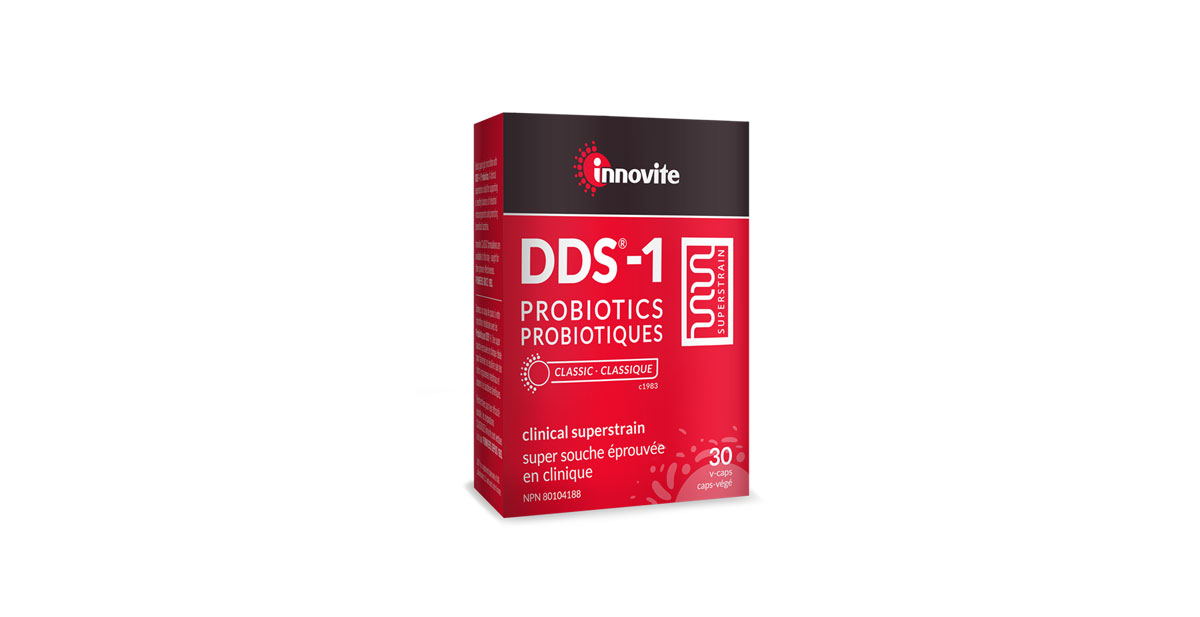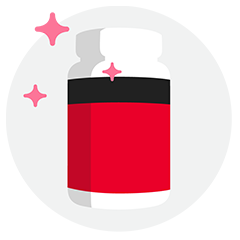How do I choose the right probiotic?
Created on: September 18, 2021

Probiotics are quickly becoming well-known for the many benefits they deliver to our body, especially when it comes to our gut and digestive health. When choosing a probiotic, it’s important to understand the different strains so you can select one that targets your health concerns. However, it can be tough to know which probiotic is right for your needs. Not to mention the (very) long, complex names of the available strains. Not to worry! We’re here to tell you everything you need to know about probiotics so you can make an informed decision.
But first, what are probiotics?
Our bodies are home to a vast array of different bacteria. In the mix, there are “bad” bacteria, which cause infection and disease, and “good” bacteria, which are highly beneficial and often reside in the gut. Probiotics fall into the category of “good” bacteria, which support gut health. It’s essential to maintain a balance between good and bad bacteria – an upset of this balance often stems from poor diet and lifestyle choices. But probiotics can help restore balance.
How do probiotic supplements work?
Taking probiotics helps restore beneficial bacteria in the gut. They’re most often recommended after taking antibiotics because while antibiotics are great at wiping out the bad bacteria behind the infection, but they also eliminate all the good bacteria along with it. In addition, probiotics help reduce pathogen levels in the body. They do this in two ways:
- Fostering colonization resistance: By rapidly multiplying, probiotics compete with pathogens for their food sources and space for colonization, which reduces the likelihood of bad bacteria surviving.
- Producing short-chain fatty acids. Short-chain fatty acids are the main source of energy for the cells lining your colon, so their production discourages the growth of pathogens, improving the gut environment. This in turn encourages the growth of other types of beneficial bacteria in the gut.
Bonus: Probiotics also support healthy skin!
In addition to supporting a healthy gut, probiotics are also known to have benefits for the skin. Research suggests that certain strains of probiotics can help balance the skin’s pH and protect against free radical damage. Others increase the skin’s production of ceramides and lipids that trap moisture in the skin and keep acne-causing bacteria levels in check. This is achieved through the production of antibacterial proteins, such as bacteriocins.
What are the different types of probiotics?
There are two groups of probiotics that are commonly available.
Lactobacillus
Lactobacillus is found naturally in the small intestine. Strains of lactobacillus naturally help with:
- Relieving diarrhea and the effects of lactose intolerance
- Supporting the immune system
- Promoting better sleep
- Improving heart health
- Reducing the risk of vaginal bacterial and yeast infections
Bifidobacterium
Bifidobacterium colonizes in the large intestine. This probiotic strain has been clinically studied to help:
- Ease symptoms of irritable bowel syndrome (IBS)
- Alleviate constipation and necrotizing enterocolitis (an infection of the intestinal lining)
- Increase antibody production and immune cell activity
- Prevent occurrences of cold and flu
Single-strain vs. Multi-strain
The difference between these two types of probiotic supplements is simple: single-strain probiotics contain only one specific bacteria, while multi-strain probiotics contain several different types of bacteria. Although it’s still a subject of debate whether one outweighs the other in terms of benefits, it’s been acknowledged that multi-strain probiotics can have a broader range of health benefits. Most probiotic supplements are multi-strain, while single-strain probiotics tend to be targeted for specific health concerns.

How long should I take probiotics?
Well, that’s entirely dependent on your health needs. Many people take probiotics daily, as research shows that it can be beneficial for overall health. Others take them periodically or when they feel they need an extra boost. For example, for those with acute diarrhea, it’s recommended to take probiotics daily for 1-5 days. For those with IBS, probiotics can be taken for 8 weeks or more. People suffering from dairy intolerance can take probiotics from anywhere between 2 months and 3 years. It just depends on your specific requirements.
When choosing a probiotic supplement, look out for the strain that targets your specific health concern. If you’re not sure which probiotic to take or how long to take them for, consult your healthcare practitioner.
Adding in probiotic foods
Eating probiotic foods alongside probiotic supplements will provide healthy bacteria in regular doses through your meals, which accelerates the growth of good bacteria in your body.
Probiotics are typically found in fermented foods. Fermentation is one of the oldest food preservation techniques. It involves a process called lactofermentation wherein naturally occurring bacteria feed on sugars and starches in food create a substance called lactic acid. This creates a preservative environment, promoting beneficial enzymes, B vitamins, and omega-3 fatty acids along with beneficial probiotic bacteria. Examples of probiotic foods include:
- Yogurt
- Kimchi
- Pickles
- Tempeh
- Miso
- Buttermilk
- Sauerkraut
Ready, set, go.
Whether you’re looking to support your gut health, recover from a course of antibiotics, or target other health needs, probiotics may be what you’re looking for. Start by introducing probiotic foods into your diet, and grab a supplement when you need that extra boost. Your gut will thank you!
Sources
Effectiveness of Multi-strain Versus Single-strain Probiotics
How Long Should Probiotics Be Taken?
Monostrain, multistrain and multispecies probiotics
The effect of probiotics on immune regulation, acne, and photoaging






